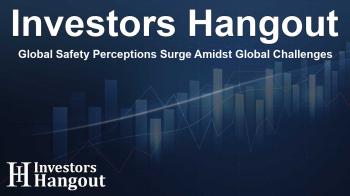Global Safety Perceptions Surge Amidst Global Challenges

Global Safety Report Highlights Significant Trends
Recent findings reveal an encouraging upward trend in global safety perceptions. Despite ongoing conflicts and uncertainties worldwide, a remarkable 73% of adults report feeling safe walking alone at night, as highlighted in Gallup's latest Global Safety Report. This report marks the highest level of safety reported since Gallup began its data collection in 2006.
Regional Safety Gains Explained
These safety gains are primarily attributed to improvements in several regions, including the Asia-Pacific, Western Europe, Latin America, and sub-Saharan Africa. Notably, Latin America and the Caribbean have achieved a significant milestone, with 50% of residents expressing confidence in their personal safety at night, a historic shift in those areas.
Insights from Gallup's CEO
Jon Clifton, CEO of Gallup, emphasized the importance of community building amidst turbulence, stating, "Even amid conflict and uncertainty, people around the world are building safer communities from the ground up. These findings reveal that safety isn't just about the absence of violence but rather about a supportive environment built on trust and resilience."
Top Countries for Safety
Leading the global safety rankings, Singapore has registered an astonishing 98% of its residents feeling safe while walking alone at night. This achievement marks the twelfth consecutive time Singapore has held the top position. In stark contrast, South Africa reported the lowest safety perception globally; only 33% of its adults feel secure, closely followed by Lesotho and Botswana, which are at 34%.
Gender Disparities in Safety Perceptions
Gender differences in safety perceptions are still a significant issue worldwide. According to the report, 67% of women feel safe walking alone at night compared to 78% of men. This discrepancy is particularly stark in various high-income nations, including the U.S. and Australia, where gaps exceed 10 percentage points, often reaching as much as 26 in some cases.
A Closer Look at the U.S. Safety Ratings
In the United States, 71% of adults report feeling safe walking alone at night, consistent with the findings over recent years. However, the gender gap remains pronounced, with only 58% of women expressing feelings of safety compared to 84% of men. This statistic underscores the ongoing challenges surrounding gender-based perceptions of safety in American society.
GCC Nations Shine in Safety Rankings
Among the countries leading the safety perception charts are five member states of the Gulf Cooperation Council (GCC): Saudi Arabia, Oman, Kuwait, Bahrain, and the United Arab Emirates, all boasting safety ratings exceeding 90%. These figures reflect significant local efforts in ensuring a secure environment for their residents.
Collaborative Efforts for Enhanced Safety
Gallup’s collaboration with the Center on International Cooperation (CIC) at New York University is a significant move towards utilizing combined expertise in violence prevention and peacebuilding. By merging Gallup's extensive global data with the CIC’s insights, they emphasize how localized initiatives, robust institutions, and strategic policies can collectively improve safety across diverse regions.
Connecting Safety to Community Resilience
Daniel Friedman, Program Director at CIC, noted, "Gallup's findings confirm what we often observe in our studies: even amid rising conflict, the perception of safety is intricately linked to the health of local communities. Understanding what fosters safety and how decision-makers might collaborate to enhance that sense of security is vital in building resilient and peaceful societies. Positive change is indeed achievable!"
About Gallup
Gallup is a premier analytics and advisory company that supports leaders and organizations in resolving pressing challenges. With over 80 years of experience, Gallup’s comprehensive understanding of global attitudes and behaviors sets it apart in shaping meaningful insights.
About the Center on International Cooperation (CIC)
The Center on International Cooperation, located at NYU, has been influential for over two decades as a leading think tank that connects various facets such as politics, security, justice, development, and humanitarian issues.
Frequently Asked Questions
What does Gallup's Global Safety Report indicate?
It reveals that 73% of adults worldwide feel safe walking alone at night, marking a record high in perceptions of safety.
Which regions saw the most significant safety gains?
The Asia-Pacific, Western Europe, Latin America, and sub-Saharan Africa reported noteworthy increases in safety perceptions.
How do gender perceptions of safety differ?
Globally, 67% of women and 78% of men report feeling safe, highlighting a notable gender disparity.
What countries rank highest in perceived safety?
Singapore tops the list with 98% of its residents feeling safe, while South Africa has the lowest perception at 33%.
What is Gallup’s role in enhancing safety globally?
Gallup uses its extensive global data and partnerships with organizations like CIC to inform policy and improve community safety worldwide.
About The Author
Contact Riley Hayes privately here. Or send an email with ATTN: Riley Hayes as the subject to contact@investorshangout.com.
About Investors Hangout
Investors Hangout is a leading online stock forum for financial discussion and learning, offering a wide range of free tools and resources. It draws in traders of all levels, who exchange market knowledge, investigate trading tactics, and keep an eye on industry developments in real time. Featuring financial articles, stock message boards, quotes, charts, company profiles, and live news updates. Through cooperative learning and a wealth of informational resources, it helps users from novices creating their first portfolios to experts honing their techniques. Join Investors Hangout today: https://investorshangout.com/
The content of this article is based on factual, publicly available information and does not represent legal, financial, or investment advice. Investors Hangout does not offer financial advice, and the author is not a licensed financial advisor. Consult a qualified advisor before making any financial or investment decisions based on this article. This article should not be considered advice to purchase, sell, or hold any securities or other investments. If any of the material provided here is inaccurate, please contact us for corrections.

